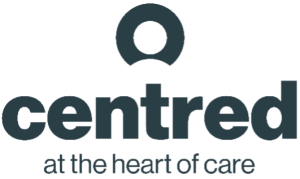
Our latest Meet the Partner series continues with June Jeffrey, Head of Health and Social Care Community Services at Centred. With around 150 staff and working across the entire Highland region, the charity helps people with mental ill-health who live in their own homes and in Centred’s Recovery Centre in Inverness.
What does Centred do, and what is its ethos?
We work with adults who are experiencing mental ill-health and, in some cases, additional issues that impact on their ability to live a meaningful and fulfilling lives. We are a progressive charity, and continue to maintain a position at the leading edge of mental health recovery within the Highlands of Scotland.
We work within the Recovery ethos, which supports people to live productive lives even if symptoms persist. We have a 23-bed Recovery Centre in Inverness, which provides support to supported people in 12 self-contained flats and 11 single rooms. The Recovery Centre was the first facility of this kind in Scotland.
In the community we provide Support and Care at Home services to people living in their own homes within local environs from Inverness, Invergordon, Lochaber and Caithness. Within the Inverness and Easter Ross services we also facilitate supported accommodation services covering 24 hours each day 7 days each week.
How did Centred get started?
It was founded as Birchwood Highland 1987, to support the closure of Craig Dunain – one of the old-fashioned asylums outside of Inverness. The Community Care Act was looking to close these huge institutions located on the outskirts of towns and cities across Britain. The Not for Profit organisation was founded as a response to this government legislation. We started as a community-based service, moving people that had spent lots of their adult life – if not all of their adult life – in old-fashioned asylums, and moving them back into properties in the Inverness area where they could be supported in a more homelyand person-centred way aimed at enabling them to become part of their own communities.
We quickly realised how big the Highland area is! And how far people had travelled to Craig Dunain. When they were leaving, they wanted to go back to areas that they were more familiar with and may have some family connections. In response, we opened a service in Easter Ross, and then one in Lochaber.
We also opened Birchwood House at that time, which was set up to offer people who still needed 24-hour care and support with the added skills and knowledge provided by qualified nursing staff. The hope was that either they would later be able to move on to supported accommodation, or if not that they would be able to live there, but in a much smaller, more person-focused environment than the big institution. Birchwood House was updated and reopened in 2017 as The Recovery Centre, offering the opportunity for people to work toward their own personal goals by managing the symptoms they may be experiencing.
Now, we also work in Caithness offering both Support Services and Care at Home to people living in the County. We cover a huge area of the Highlands, but there are still a few gaps, just because of the size and geography of the Highlands. We continue to lobby for equality of access to services.
How do people come to you these days?
In Highland it’s a bit different from other areas: adult services are commissioned by NHS Highland, they are our biggest commissioners of services.
It’s usually either because someone has been or is being discharged from hospital and will need ongoing support to live as independently as possible at home. People and families come to their notice for other reasons, not necessarily just through hospital. So social work often make referrals directly.
The Highlands area is exceptionally large and sparsely populated. How does that affect the way that you work?
As a service, we have to realise that people do live quite isolated lives, and access to services is hugely challenging. Over the years, living in these communities has actually become even more of a challenge, especially right now due to the cost of living crisis. Having supported staff and people using our services through covid – further isolating people – we now face the cost of living crisis. And, of course, accessing services in the Highlands comes at an additional cost.
The cost of providing services in remote areas is not really considered by Scottish Government and therefore our commissioners.
Can technology be part of the solution, now or in the future?
It is right now. A big project at the moment is to reach out to people in the community and find ways of how to support them, whether that be on a one-to-one basis in their own home, or as part of group, or using new technology. I guess one of the positives from covid was that we all got used to communicating using Zoom and Teams and those types of things.
NHS, of course, use a lot of these technologies for appointments, especially in remote areas. However, that does have challenges about internet access and the cost of that. It’s certainly becoming a preferred way for younger people. They have their mobile phones, but a small screen can be a challenge for older people.
What projects are you currently working on?
We’ve recently opened a Discovery College, which works with people in the community. (Not necessarily people who have been commissioned for support, but people that are out there and don’t know where to go, or how to access services.)
People will be able to drop in and see who we are and what we’re about, and they can work on their own objectives. We’ll provide some learning courses that will be certificated, but over and above that there’ll be help to prevent isolation. Being able to come along and have a chat and a cup of tea with people who are peers. We have three Peer Support Workers who all have lived experience.
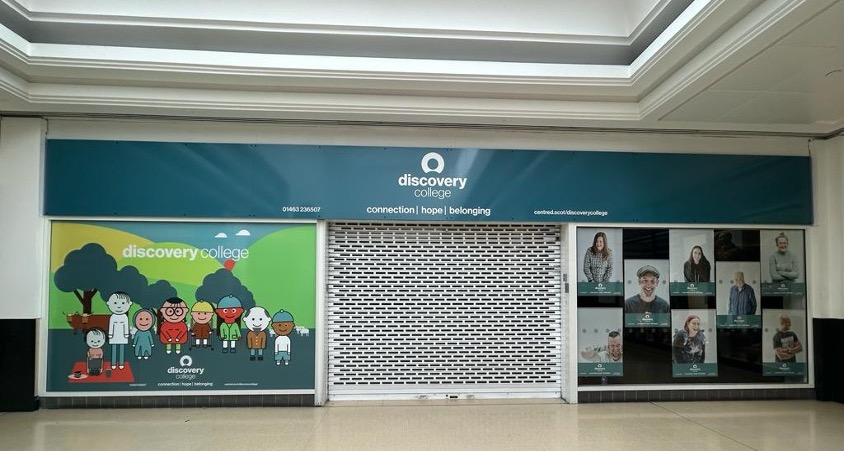
What sorts of mental health problems are experienced by the people you work with?
The full range. However, people who have been referred through NHS partners tend to live with significant mental ill-health: schizophrenia, personality disorder, bipolar…. but I think that what’s missing there are people who have anxiety and depression and just live with it. They never come to notice of services. The aim of the Discovery College is for people to reach out and find us.
Does someone’s location affect their likelihood of experiencing mental health problems: do they occur more in cities and less in rural areas, or vice versa?
It’s probably impossible to say, because people who live in cities have access to more services, so they’re more likely to come to the notice of those services.
And looking at it the other way, the outcome of people living with mental ill-health, or trauma, or any of these type of challenges, is that they have less life opportunities and therefore often end up in areas of deprivation and poverty. So, I think it works both ways.
How did your connection with Future Pathways come about?
I got a call from Future Pathways last year. You were looking for a provider to work with a particular individual that was being supported by staff based outside the Highland area. The individual was then offered a number of services in the area, and chose Centred as their preferred support provider.
The person, very fortunately, lives centrally and close to services. So we were able to provide support reasonably quickly, without anyone having to do lots of travelling.
Since then we’ve become an approved provider. There’s a lot of information that’s needed! All our staff are trained, and we’re fully insured. We’re registered with the Care Inspectorate, all our workers are SSSC-registered.
We’re really looking forward to working more with Future Pathways, and hopefully across the Highlands. Inverness is the main hub of need, but don’t forget that we are available to provide support from Caithness to Lochaber.
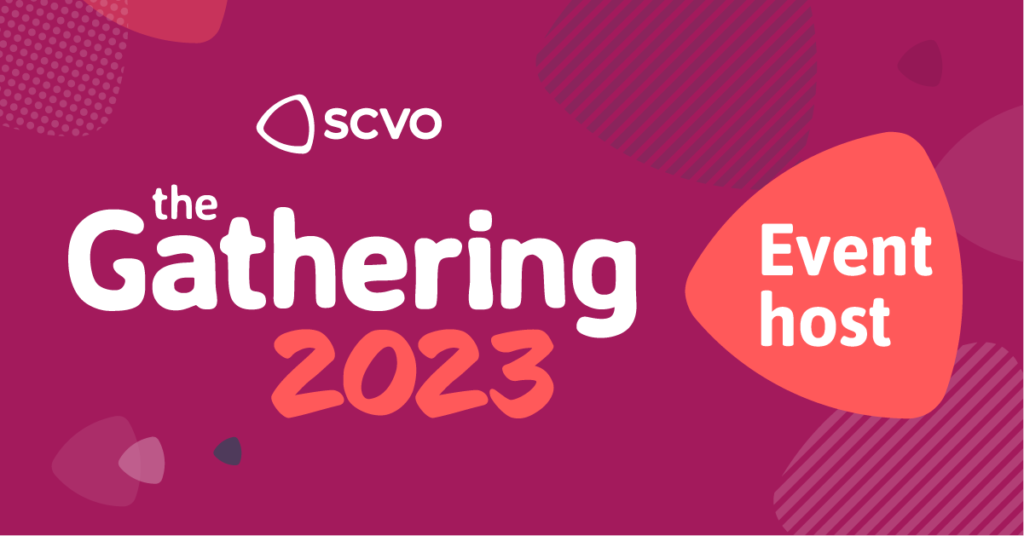
We are looking forward to attending SCVO’s The Gathering 2023. At this year’s event, we will have an exhibitor stand where you can find out more about who we are and what we do, and make connections with staff from across the service. Join us at stand 29 on 7th and 8th November to discover more.
We are delighted to also be hosting a partnership event with research company Matter of Focus at 9.30am on Wednesday 8 November. Titled “Opportunities and Challenges: evaluating relational services in a partnership context”, we will share what we have learned about evaluating the relationships we build as a service.
We have found that developing trusting relationships with people we support and our partners means improved outcomes for people and services. Matter of Focus have helped us evaluate our relational approach to partnership working since 2018. This has helped us understand more about Future Pathways’ impact at scale. But it can also be challenging. Often, services have assumptions about partnership working that need to be considered and evidenced.
At this event, we will share what we have learned about how to evidence and understand our relational approach, drawing on examples from our work with people we support and partners. We will explore how this evaluation has enabled us to make decisions about refining our model of support and enhance our impact.
At this event and at our exhibition stand, we hope to highlight our work and our impact, and create connections with other services.
“Future Pathways is the first service of its kind, pioneering a relational approach to working with survivors of abuse and neglect in care. Embedding evaluation and learning into the service from the start means not only that Future Pathways are really clear that their service is effective and their work is making a difference to survivors, but has also allowed them to continually refine and innovate their approach to make the best difference possible. Matter of Focus are delighted to be working alongside an organisation with such a deep commitment to learning and improvement.’’
Ailsa Cook, Director, Matter of Focus
“We are looking forward to attending SCVO’s The Gathering 2023 as both exhibitor and as event host. Sharing our learning with others is an essential part of our work and we are delighted to be part of SCVO’s diverse and inspiring programme. We hope to spark discussion and reflection with those working across the sector, and look forward to sharing information about who we are and what we do.’’
Flora Henderson, Alliance Manager, In Care Survivors Alliance
The Gathering is the largest free voluntary sector event in the UK and it is organised by the SCVO (Scottish Council for Voluntary Organisations). This is an opportunity for Future Pathways and many other services to showcase their work and learn from others. The Gathering will take place at the EICC in Edinburgh on Tuesday 7 November and Wednesday 8 November.
This is an update about Future Pathways’ fund, used to help support the people we work with.
We call this our Discretionary Fund or DF for short. However, below, we will simply refer to it as ‘the fund’.
The fund is one of the different types of support that people can access from Future Pathways. It is used to support people work towards their goals.
It is important that we use the fund fairly, that the fund is available to everyone, and that we can make the fund stretch as far as possible. With that in mind, we are making two changes to the fund for the purchase of items:
- There will now be a limit on how much an individual can access the fund in a 12-month period. An individual will only be able to access up to £5,000 in 12 months for purchasing items.
- There will now be a limit on the amount that an individual can request in a single application. For items and goods, we will accept single applications of no more than £3,000.
For requests of over £1,000, a Support Coordinator writes an application to the fund on a person’s behalf. Before these new changes take place, four weeks will be given for pending applications to be completed. ‘Pending’ means applications that have already been agreed with Support Coordinators. These must be completed before 1st December.
For applications that have not already been agreed with Support Coordinators, the new limits will apply to all new requests from 1st November.
Only in very special cases, where there is an immediate and clear need, requests outside the limits may be approved by members of the Alliance Leadership Team. The Alliance Leadership Team oversees Future Pathways.
We would rather not have to add limits to how much you can access from the fund. We know that it is an important part of support from Future Pathways. But making these changes now, helps us to make sure that:
- the fund can be accessed by everyone supported by Future Pathways
- the changes affect as few people as possible
- we can continue to make the fund available
The reason for needing to make these changes is due to a number of factors that have been impacting the fund:
- Many people we support are affected by the cost-of-living crisis. This has led to more requests being made to the fund.
- The cost of items and services has gone up which means the fund is stretched even further.
- We are trying to support a larger group of people as more people come forward for support from Future Pathways.
Following the changes, we will review how much of the fund is spent each month. We hope that no further changes will be needed. But we might need to look again if costs continue to be higher than planned.
We know that change can be difficult. We have taken the time to really consider these changes. Our hope is that we can maintain our service in the best possible way, and with as little disruption as possible to the people we support.
The role of Future Pathways remains the same. We are here to support people with their goals and to help people work towards them.
We issued further information on the Discretionary Fund in an information sheet.
If you have any questions, you can:
- email us at engagement@future-pathways.co.uk
- write to us at Future Pathways, 40 Shandwick Place, Edinburgh EH2 4RT
We have sent communication to all people in active support. The information about these changes were sent via letter and / or email (depending on their communication preference). Letters were dispatched on Monday 23 October and emails were sent the same day.
Our latest Quarterly Report is now available to view. It covers our work from April to June 2023. It shows what we’ve learnt, and includes key stats and feedback from those who access Future Pathways.
What happened in Q1
57 people registered with Future Pathways.
15 people started working with a Support Coordinator.
80 people accessed support from 26 Delivery Partners.
Who we worked with
The average age of people who registered with us was 46.
77% of people who register with us live in the Central Belt of Scotland.
We learned that most of the people we support may have a disability or a health condition.
How people felt
Most of the feedback we received was positive.
Some people told us they felt listened to and able to trust the service.
On the other hand, waiting for support can make people feel frustrated, unable to progress and unimportant.
What people gained
People gained access to a wide range of supports.
Accessing mental health supports and exploring creative interests were most helpful.
What changed for people
Someone we supported shared what is different for them:
“It has given me a lot of confidence […] Now I want to give something back.”
What difference we made
Someone we supported shared the sense of purpose they now feel:
“I know I am there for the right reason, to make people realise that they have a voice […] I feel passionate about Voices for a Better Future.”*
Our full report features further infographics, feedback and a breakdown of our financial spend. Read the full report.
A note that our Registration Line is closed Monday 16th October to Friday 20th October. The line will open again at 10am on Monday 23rd October.
If you’re finding things hard, it can be good to talk to someone.
The Samaritans
Breathing Space
Shout
We are delighted to share our final report from the Action Learning Programme. Created by The Lasting Difference, the report highlights the learning and feedback from engagement sessions held with a group of services we work alongside.
These sessions helped us to:
- Explore best practice and ways to remove barriers to support.
- Explore how partnership working can contribute to lasting change for individuals and the wider system.
- Identify ways to increase collaborative working.
- Inform how we think about our collective impact going forward.
Together we considered the challenges to collaborative working, and how we could address these. We also discussed what supports effective, impactful partnership working.
We found that our collaborative approach to commissioning brings trust, choice and flexibility to our outcomes-focused support. It also creates a network of support, knowledge and learning with Delivery Partners which, in turn, helps navigate complexity and offer holistic support.
We also found that our collaborative approach to commissioning can face systemic challenges. For example, inaccessible services, capacity challenges or confusion around national programmes of support can hinder the way we can work together.
Thanks to the insights from participants, we also learned more about what we do well and where there is room for improvement so we can address challenges to enable wider impact.
We would like to thank all those who took part in the process. Their insight and feedback was invaluable.
“This Action Learning Programme helped us consolidate what we have learned about sustaining collaborative relationships with partners. This project was an opportunity to work with our partners to explore how we can enhance our approach to working together, so we can continue supporting people to work towards their personal outcomes. It highlighted the importance of building ongoing communities of practice, and of evaluating our wider impact.”
Louise Hall, Impact and Evaluation Lead, Future Pathways
“It was so helpful to better understand Delivery Partners’ experience of working with Future Pathways. For me being relatively new to my role, the voices of everyone in the group and the learning that was shared about what works, helped to shape my own approach as partner relationships lead. The opportunities for learning and improvement can’t be overestimated.”
Nell Glen, Partner Relationships Lead, Future Pathways
“People are better supported when the different parts of the system work better together. Future Pathways have shone a light on this by convening partners and exploring how the capacity within the system can be used better. This report shows that more collaborative, trauma-informed commissioning is not only necessary, it’s clearly achievable.”
Graeme Reekie, Director, The Lasting Difference

Our Impact is a short overview of the difference we make.
We recently published our latest impact report, Stepping Stones, and a summary version of the report. We now also have a short version of our impact report. It gives you key information from our report in just 8 pages.
The short version tells you what we learned about:
- What we do
- The people we support
- The impact we have on the people and services we work with
We also share the ways we would like to learn more. And how you can help us by giving feedback on our service.
Did you know that you do not need to live in Scotland to access Future Pathways’ support? Ian, who registered with Future Pathways in 2019, was sent to Australia as a child migrant. He has lived there since he was around 7 years old. Ian is also supported by Tuart Place, a West Australian support service for adults who were in any type of out-of-home care when they were children, including former child migrants.
Here, Ian shares his talent for model making.
Ian started making model windmills when he retired about 12 years ago. Since then, he has made around 2,500 of them! Ian explains, “It’s just something that I taught myself to do because I knew all about them after working in the bush and on farms”.
Ian was of the generations that depended on windmills more than most because he grew up in rural, remote areas. Years ago in Australia, these windmills were everywhere, even in the suburbs. It was the main way for many people to draw water up to the surface.
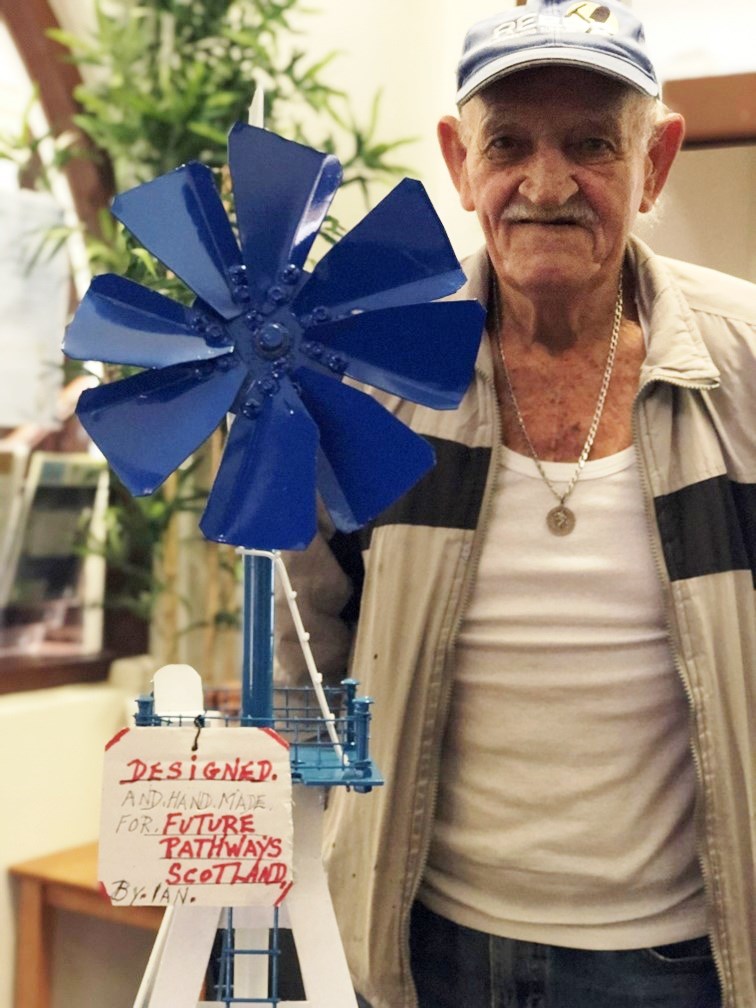
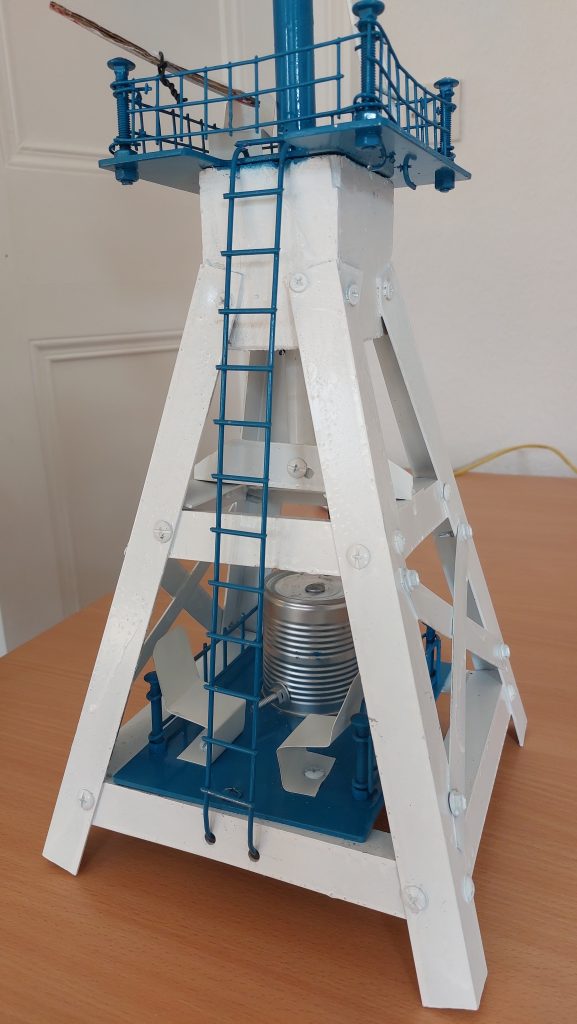
Talking about making his windmills, Ian shares:
“I get a lot of pleasure out of it. I make the frame one day then the next day do the spindle at the top. It takes me about 10 hours to make one, whatever the size. The bigger ones are easier to make because you can get your hand in. My design is good too because I put extra things in, like chairs on each landing. Some of the windmills are quite small, others are as tall as a person. When it comes to the end of making one, I’m so happy.”
Ian, who recently turned 80 but says he feels about 40, makes windmills in all different colours. He has used football colours, Irish colours, aboriginal colours (red, black and yellow), and others are silver, like windmills in the bush. Ian made one in yellow and blue which was auctioned off to raise money for Ukraine. Another he made as tall as a door which raised $1500 for kids. He even presented one to a member of the Australian parliament who came to Tuart Place and took it back to Canberra with them.
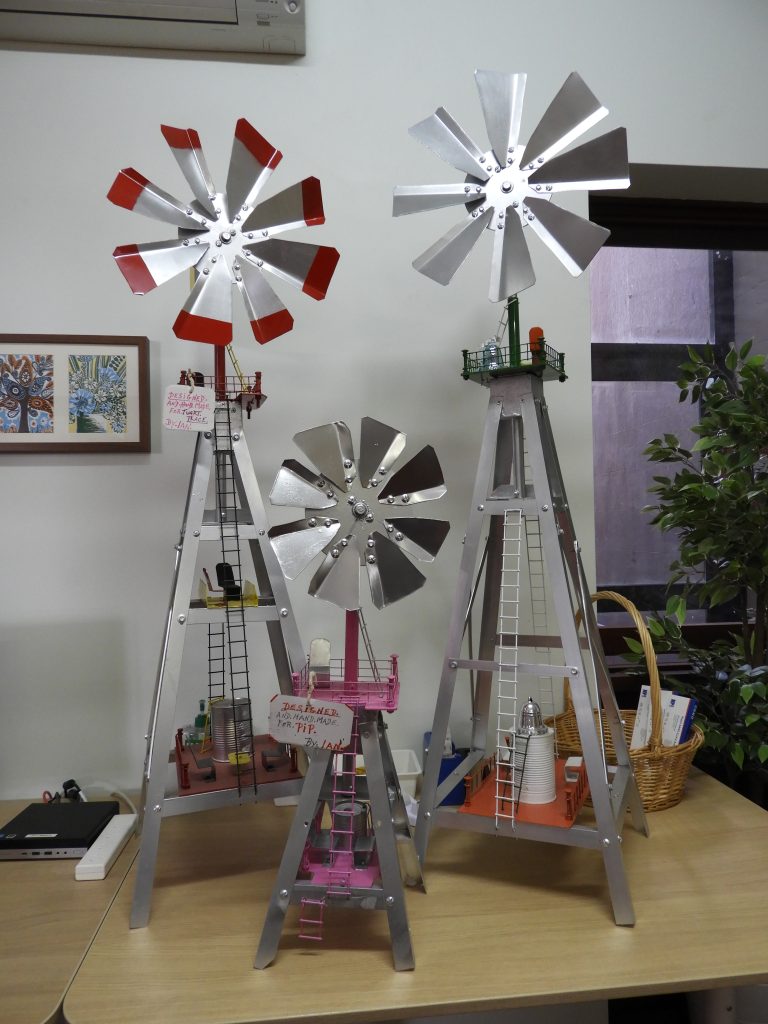
Ian’s talents extend to other models too:
“I’ve also made a model of Sydney Harbour Bridge about 3 meters long, and a beautiful dolls house on wheels. I even made the furniture to go into it and battery-operated lights. That one got raffled at Tuart Place. Everyone who sees my models, they fall in love with them.”
And now Ian’s windmills have even travelled half-way around the world to Scotland after he very kindly made one for Future Pathways, and we love it! As Ian put it, “it’s a little bit of Ian and a little bit of Australia, in the middle of Scotland.”
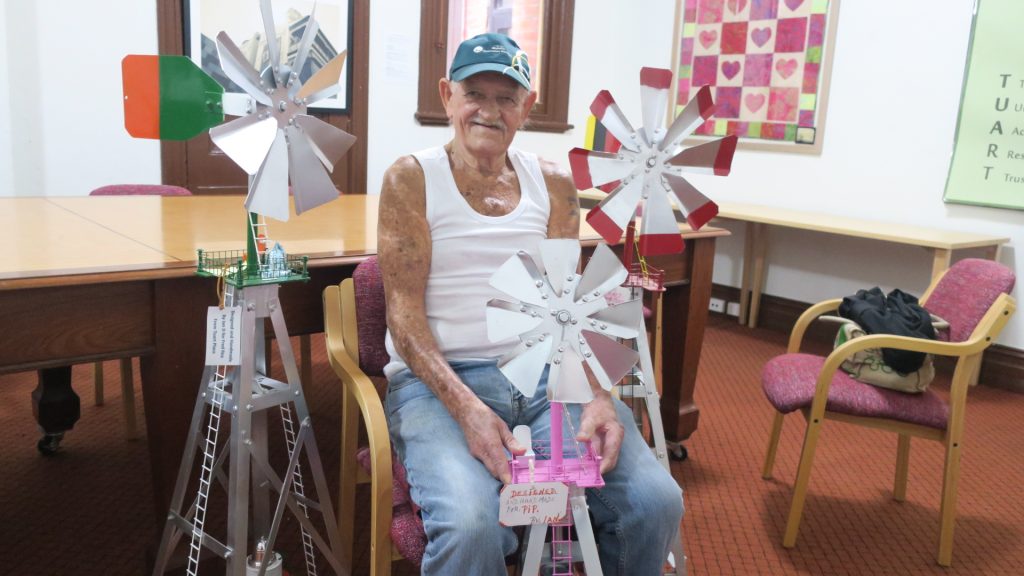
Growing stronger together
Tuart Place is a support service for adults in Western Australia who were in any kind of out-of-home care when they were children. Funded by the state government, it is based in the city of Freemantle, just south of Perth. Its motto is ‘growing stronger together’, and it provides a lot of different services, including counselling, social activities, informal support groups, training courses and records tracing
www.tuartplace.org
Flora Henderson, Alliance Manager, explores how working together as an Alliance can strengthen the service we deliver.
Delivered by the In Care Survivors Alliance, Future Pathways was set up to offer something tangibly different to people who experienced childhood abuse or neglect in Scottish care settings. The aim was to directly reduce the inequalities that come from such experiences.
Our vision was for people to have fuller, healthier and more independent lives.
And that this could be achieved by focusing on what was most important to someone and by providing tailored support according to the personal outcomes or goals they wished to progress.
It is known that the impact of childhood abuse is individual and wide ranging. No two people were alike in their experiences, therefore a personal response was vital. Having consulted with people about what was important to them, the challenge was to respond to a wide range of needs in a personal way. It was hard to see how a single organisation could respond.
Early evidence highlighted the importance of this: by the time our first scoping report was completed, it was clear that people usually had multiple needs and few supports. Indeed, we found that people had shown great resilience in the face of services that did not always understand or respond to their needs. More of the same would not do.
In an alliance, each partner is required to act in a certain way to achieve a common goal.
The Scottish Government identified that alliancing had the potential to offer something new and different. The initial test was whether alliancing would enable partner relationships that allowed for a flexible response to individuals. Done well, it is a culture of innovation and learning, with all partners sharing risk as well as opportunities, never losing focus of the person’s needs and requirements.
In Care Survivors Alliance brings together four partners:
While each organisation has specific qualities, experience or remit that we can draw on, we also know that working together enables more effective support for those who access Future Pathways.
Each partner can share learning, knowledge and expertise to strengthen the service we deliver.
Our collaborative approach also extends to our network of Delivery Partners and beyond. These are the organisations, services and individuals from which we commission support. Over time, we have developed and strengthened our network and we now work with around 62 active Delivery Partners. This commissioning model also offers the flexibility to respond to individual need, offer real choice to people and to truly tailor our support. For example, our network includes organisations and practitioners working across counselling, therapy and record searches, as well as in life coaching, or creative writing services.
Our hope was that alliancing would lead us to a style of working that fostered inclusivity and learning.
There is a sense that a consistent priority placed on relationships and learning. There are examples of support being offered in new and different ways, improving the response to individuals.
We have more to learn about the unique contribution that Future Pathways and our partners make in understanding what is most important to someone and convening support around them accordingly.
Collaboration is essential to any alliance model. This is clearly the case for Future Pathways: our aims can only be achieved through the joint working and shared values of our four Alliance partners. We are committed to building relationships, learning from each other and reducing barriers to support where we find them.
Alex has been working with us for about a year. We helped him to write a book – and he’s already planning the next one.
Alex is in his early 70s, and had never written a book before. However, when the idea came up during a call with his Support Coordinator, he was interested. Alex says, “I knew I had enough stuff to say, but I just wasn’t sure I was ready at that time.”
Alex decided to go for it, and the book was recently printed. It’s called ‘Priests Don’t Dae That’. It’s about Alex’s life, mainly his childhood in the 1960s. He wrote it with the help of Lea Taylor from the Book Whisperers. The Book Whisperers help people to write books.
The writing and editing process worked well. Alex explains: “I’d put pen to paper, and then I would meet up with Lea and give her my pages. She would then put it all together for me. And she designed the book cover for me too.”
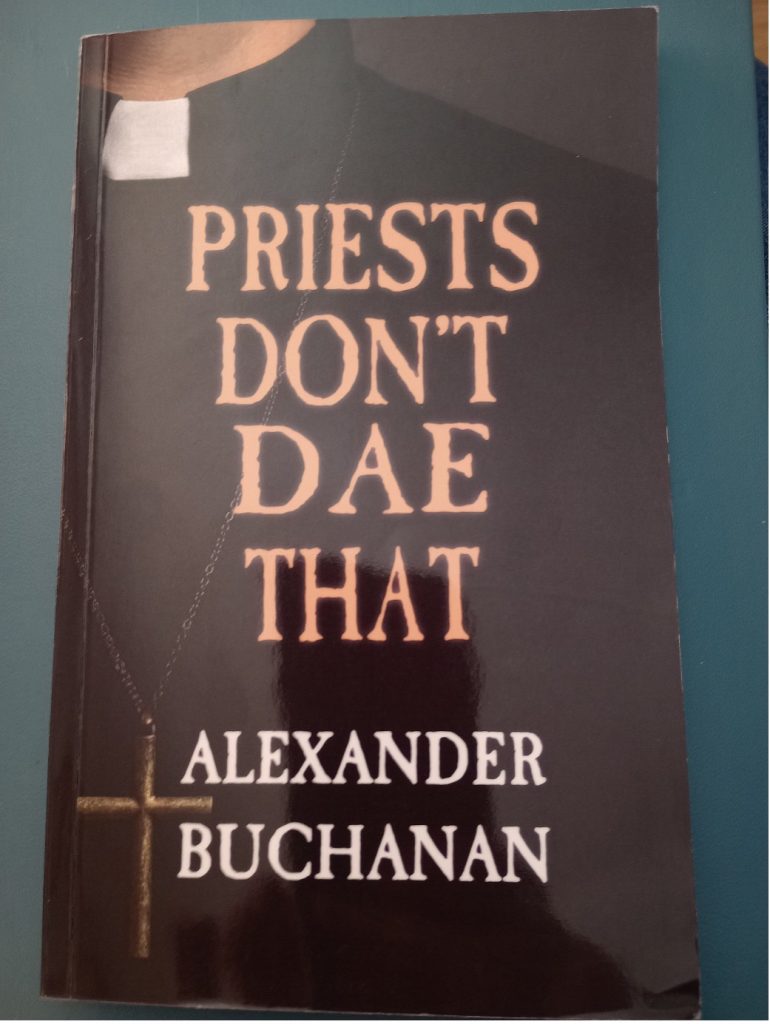
It took Alex just a month or two to write the book: “Once I started writing, it came quite easily.”
Lea really enjoyed the process too. She told us “It was a joy working with Alex on so many fronts.” Lea told us how dedicated Alex was to writing his book. She said that “best of all was witnessing such a wonderful change in him as the work and his confidence progressed.
His story was fascinating, and I’m delighted to have helped Alex produce this powerful piece of work.”
The people at the Book Whisperers believe that just the process of writing a book can make you feel better about things, and that was true for Alex: “It was a great experience. I wish that I got it all out sooner, honestly, but I’m glad I have done it now, and I’m now more level-headed. I’m very thankful to Future Pathways and to the Book Whisperers.”
And what’s next for Alex? “I might write another couple!”
